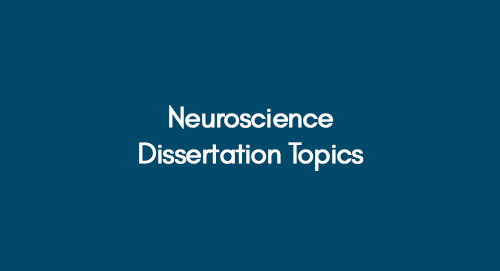
135 Amazing Journalism Dissertation Topics in 2025
December 26, 2022
Interesting Psychology Dissertation Examples For Students
December 26, 2022Neuroscience deals with the study of the structure and function of the human brain. It is a vital field in health sciences, particularly for brain disorder treatments. Students pursuing medical degrees need to research neuroscience to complete their dissertation modules. Selecting quality neuroscience dissertation topics is the first step to starting their research.
Find Out a Full List of Healthcare Dissertation Examples
Premier Dissertations has prepared an up-to-date list of various exciting neuroscience research topics for 2025.
Psychology Dissertation Topics | Mental Health Dissertation Topics
List of latest Neuroscience Topics for 2025
Trending Neuroscience Research Topics
Top Dissertation Topics in Neuroscience
Neuroscience Dissertation Topics For Undergraduate Students in 2025
Topic 16. Understanding the Role of Neuroplasticity in Recovery from Traumatic Brain Injuries: A Case Study
Topic 17. Examining the Impact of Sleep Deprivation on Cognitive Function in Young Adults: A Quantitative Study
Topic 18. Analysing the Effects of Meditation on Brain Connectivity in University Students: A Systematic Study
Topic 19. Evaluating the Relationship Between Nutrition and Cognitive Decline in Aging Populations: A Qualitative Study
Topic 20. Assessing the Influence of Early Childhood Experiences on Brain Development: A Case Study
Topic 21. Understanding the Role of Neurotransmitters in Regulating Anxiety: A Quantitative Study
Topic 22. Examining the Effects of Digital Screen Time on Neural Activity in Adolescents: A Systematic Study
Topic 23. Analysing the Impact of Music Therapy on Brain Function in Patients with Alzheimer's Disease: A Qualitative Study
Topic 24. Evaluating the Role of Exercise in Enhancing Memory and Learning: A Case Study
Topic 25. Assessing the Connection Between Gut Microbiota and Brain Health in the UK Population: A Quantitative Study
Topic 26. Understanding the Neural Mechanisms of Decision-Making Under Stress: A Systematic Study
Topic 27. Examining the Impact of Chronic Stress on Hippocampal Volume in University Students: A Qualitative Study
Topic 28. Analysing the Neural Basis of Creativity in Art Students: A Quantitative Study
Topic 29. Evaluating the Role of Virtual Reality in Neurological Rehabilitation: A Case Study
Topic 30. Assessing the Effects of Chronic Alcohol Consumption on Cognitive Functions in Young Adults: A Systematic Study
Topic 31. Understanding the Neural Correlates of Empathy in Social Interactions: A Qualitative Study
Topic 32. Examining the Impact of Bilingualism on Brain Structure and Function: A Quantitative Study
Topic 33. Analysing the Effects of Aerobic Exercise on Neurogenesis in Young Adults: A Case Study
Topic 34. Evaluating the Role of Dopamine in Reward-Based Learning: A Systematic Study
Topic 35. Assessing the Effects of Social Media on Adolescent Brain Development: A Qualitative Study
Topic 36. Understanding the Neural Mechanisms of Chronic Pain Perception: A Quantitative Study
Topic 37. Examining the Impact of Music Training on Brain Plasticity in Childhood: A Systematic Study
Topic 38. Analysing the Relationship Between Sleep Patterns and Academic Performance: A Case Study
Topic 39. Evaluating the Impact of Mindfulness Practices on Neural Stress Responses: A Qualitative Study
Topic 40. Assessing the Role of Neurofeedback in Treating Attention Deficit Hyperactivity Disorder (ADHD): A Quantitative Study
Topic 41. Understanding the Effects of Neurodegenerative Diseases on Emotional Processing: A Systematic Study
Topic 42. Examining the Neural Basis of Memory Retrieval in Elderly Populations: A Case Study
Topic 43. Analysing the Effects of Light Therapy on Seasonal Affective Disorder: A Quantitative Study
Topic 44. Evaluating the Impact of Peer Support on Mental Health Recovery: A Qualitative Study
Topic 45. Assessing the Role of Neuroinflammation in Depression: A Systematic Study
Topic 46. Understanding the Neural Mechanisms of Addiction Recovery: A Case Study
Topic 47. Examining the Relationship Between Brain Asymmetry and Language Processing: A Quantitative Study
Topic 48. Analysing the Effects of Cognitive Behavioral Therapy on Neural Circuits: A Systematic Study
Topic 49. Evaluating the Impact of Gaming on Neural Reward Systems in Adolescents: A Qualitative Study
Topic 50. Assessing the Influence of Oxytocin on Social Bonding: A Quantitative Study
Topic 51. Understanding the Role of Glial Cells in Cognitive Function: A Systematic Study
Topic 52. Examining the Effects of Early-Life Stress on Brain Connectivity: A Case Study
Topic 53. Analysing the Role of Neural Networks in Visual Perception: A Quantitative Study
Topic 54. Evaluating the Neural Correlates of Motivation in Learning Environments: A Systematic Study
Topic 55. Assessing the Impact of Chronic Inflammation on Neural Degeneration: A Qualitative Study
Neuroscience Dissertation Topics For Undergraduate Students in 2025
Topic 56. Analysing the Impact of Chronic Sleep Deprivation on Cognitive Function and Brain Plasticity: A Quantitative Study
Topic 57. Evaluating the Role of Neuroinflammation in the Development of Alzheimer's Disease: A Systematic Study
Topic 58. Examining the Neural Mechanisms of Emotional Regulation in Individuals with Borderline Personality Disorder: A Case Study
Topic 59. Understanding the Effects of Mindfulness Meditation on the Default Mode Network: A Qualitative Study
Topic 60. Assessing the Role of Genetic Factors in the Development of Parkinson's Disease: A Quantitative Study
Topic 61. Analysing the Impact of Neurofeedback Training on ADHD Symptoms: A Systematic Study
Topic 62. Evaluating the Effectiveness of Virtual Reality-Based Cognitive Rehabilitation in Stroke Patients: A Case Study
Topic 63. Examining the Effects of High-Intensity Interval Training on Brain Function in Older Adults: A Quantitative Study
Topic 64. Understanding the Neural Basis of Empathy and Compassion in Healthcare Professionals: A Qualitative Study
Topic 65. Assessing the Role of Gut Microbiota in Brain Function and Behaviour: A Systematic Study
Topic 66. Analysing the Effect of Antidepressant Medications on Brain Activity in Depressed Patients: A Quantitative Study
Topic 67. Evaluating the Effects of Age-Related Changes in Brain Structure on Memory Performance: A Case Study
Topic 68. Examining the Role of Dopamine in Reward Processing and Addiction: A Systematic Study
Topic 69. Understanding the Neural Mechanisms of Stress and its Impact on Mental Health: A Qualitative Study
Topic 70. Assessing the Role of Brain-derived Neurotrophic Factor in Neurogenesis and Cognitive Function: A Quantitative Study
Topic 71. Analysing the Impact of Chronic Pain on Brain Networks and Cognitive Function: A Case Study
Topic 72. Evaluating the Impact of Cognitive Training on Neural Efficiency in Older Adults: A Systematic Study
Topic 73. Examining the Relationship Between Brain Networks and Language Acquisition in Children: A Quantitative Study
Topic 74. Understanding the Effects of Oxytocin on Social Bonding and Empathy: A Qualitative Study
Topic 75. Assessing the Role of Neurotransmitters in the Pathophysiology of Schizophrenia: A Case Study
Topic 76. Analysing the Role of the Prefrontal Cortex in Decision-Making and Impulse Control: A Systematic Study
Topic 77. Evaluating the Effects of Cognitive Behavioral Therapy on Brain Function in Patients with Anxiety Disorders: A Quantitative Study
Topic 78. Examining the Relationship Between Emotional Intelligence and Brain Function: A Case Study
Topic 79. Understanding the Neural Mechanisms of Habit Formation and Addiction: A Qualitative Study
Topic 80. Assessing the Impact of Exercise on Neuroplasticity and Cognitive Function in Children with ADHD: A Systematic Study
Topic 81. Analysing the Role of Glial Cells in Synaptic Plasticity and Brain Health: A Quantitative Study
Topic 82. Evaluating the Effects of Transcranial Magnetic Stimulation on Brain Activity in Depression: A Case Study
Topic 83. Examining the Impact of Video Games on Brain Function and Behaviour in Adolescents: A Quantitative Study
Topic 84. Understanding the Neural Basis of Consciousness: A Qualitative Study
Topic 85. Assessing the Impact of Chronic Stress on Hippocampal Function and Memory: A Systematic Study
Topic 86. Analysing the Neural Mechanisms of Emotion Recognition in Autistic Spectrum Disorder: A Case Study
Topic 87. Evaluating the Role of Brain Connectivity in Predicting Treatment Response in Major Depressive Disorder: A Quantitative Study
Topic 88. Examining the Effects of Chronic Inflammation on Neurodegenerative Diseases: A Systematic Study
Topic 89. Understanding the Neural Mechanisms of Attachment and Love: A Qualitative Study
Topic 90. Assessing the Role of Amygdala Function in Emotional Processing and Fear Conditioning: A Case Study
Topic 91. Analysing the Impact of Alcohol Use on Brain Development in Young Adults: A Quantitative Study
Topic 92. Evaluating the Effects of Cognitive Rehabilitation on Brain Function in Patients with Traumatic Brain Injury: A Systematic Study
Topic 93. Examining the Role of Dopamine in Motivation and Reward Systems: A Case Study
Topic 94. Understanding the Neural Effects of Long-Term Meditation on Attention and Emotional Regulation: A Qualitative Study
Topic 95. Assessing the Influence of Chronic Pain on Brain Function and Cognitive Processes: A Quantitative Study
Neuroscience Dissertation Topics For Undergraduate Students in 2025
Topic 96. Analysing the Effects of Early-Life Adversities on Brain Development and Mental Health: A Quantitative Study
Topic 97. Evaluating the Role of Epigenetics in Neurodegenerative Diseases: A Systematic Study
Topic 98. Examining the Neural Mechanisms of Long-Term Memory Storage and Retrieval: A Case Study
Topic 99. Understanding the Role of Gut-Brain Axis in Neurodevelopmental Disorders: A Qualitative Study
Topic 100. Assessing the Impact of Aging on Brain Network Efficiency and Cognitive Decline: A Quantitative Study
Topic 101. Analysing the Role of Neuroinflammation in Traumatic Brain Injury Recovery: A Systematic Study
Topic 102. Evaluating the Effectiveness of Stem Cell Therapy in Regenerating Damaged Brain Tissue: A Case Study
Topic 103. Examining the Impact of Stress on Brain Regions Involved in Emotion Regulation: A Quantitative Study
Topic 104. Understanding the Neural Basis of Social Cognition in Autism Spectrum Disorder: A Qualitative Study
Topic 105. Assessing the Role of Brain-Computer Interfaces in Restoring Cognitive Function in Neurodegenerative Diseases: A Systematic Study
Topic 106. Analysing the Role of Mitochondrial Dysfunction in Neurodegenerative Diseases: A Quantitative Study
Topic 107. Evaluating the Effects of Transcranial Direct Current Stimulation on Cognitive Performance: A Case Study
Topic 108. Examining the Impact of Chronic Inflammation on Cognitive Decline in Alzheimer's Disease: A Systematic Study
Topic 109. Understanding the Neural Correlates of Empathy in Individuals with Psychopathy: A Qualitative Study
Topic 110. Assessing the Impact of Sleep Disorders on Brain Function and Mental Health: A Quantitative Study
Topic 111. Analysing the Effects of Meditation on Brain Plasticity and Cognitive Function: A Systematic Study
Topic 112. Evaluating the Role of Dopaminergic Pathways in Reward Processing in Obesity: A Case Study
Topic 113. Examining the Role of the Blood-Brain Barrier in Neurodegenerative Disease Progression: A Quantitative Study
Topic 114. Understanding the Impact of Psychotropic Drugs on Brain Function and Behavior: A Qualitative Study
Topic 115. Assessing the Effect of Chronic Social Isolation on Neural Connectivity and Mental Health: A Systematic Study
Topic 116. Analysing the Neural Mechanisms of Decision-Making in Risk-Taking Behavior: A Quantitative Study
Topic 117. Evaluating the Impact of Genetic Modifications on Cognitive Function and Behavior in Mice Models: A Case Study
Topic 118. Examining the Role of the Default Mode Network in Resting-State Brain Activity: A Systematic Study
Topic 119. Understanding the Mechanisms of Sensory Processing and Perception in the Brain: A Qualitative Study
Topic 120. Assessing the Role of Glutamate Receptors in Cognitive Disorders: A Quantitative Study
Topic 121. Analysing the Effects of Age-Related Brain Changes on Memory Encoding and Retrieval: A Systematic Study
Topic 122. Evaluating the Role of MicroRNAs in Brain Development and Disease: A Case Study
Topic 123. Examining the Impact of Cognitive Rehabilitation on Brain Function in Stroke Survivors: A Quantitative Study
Topic 124. Understanding the Effects of Chronic Pain on Brain Reward Systems and Coping Strategies: A Qualitative Study
Topic 125. Assessing the Role of the Hippocampus in Spatial Memory and Learning in Aging Populations: A Systematic Study
Topic 126. Analysing the Influence of Social Media on Neural Reward Systems and Mental Health in Adolescents: A Quantitative Study
Topic 127. Evaluating the Impact of Neurofeedback on Cognitive Function and Emotional Regulation: A Case Study
Topic 128. Examining the Neural Mechanisms of Creativity and Innovation in the Brain: A Systematic Study
Topic 129. Understanding the Role of the Prefrontal Cortex in Social Decision-Making and Morality: A Qualitative Study
Topic 130. Assessing the Neural Effects of Long-Term Substance Abuse on Cognitive Function: A Quantitative Study
Topic 131. Analysing the Impact of Neurodegeneration on Visual and Auditory Processing in Patients with Alzheimer's: A Case Study
Topic 132. Evaluating the Impact of Lifestyle Interventions on Brain Health in Middle-Aged Adults: A Systematic Study
Topic 133. Examining the Relationship Between Brain Aging and Executive Function in Older Adults: A Quantitative Study
Topic 134. Understanding the Role of Neural Oscillations in Attention and Cognitive Control: A Qualitative Study
Topic 135. Assessing the Role of the Amygdala in Fear Memory and Anxiety Disorders: A Case Study
How to Choose Neurology Topics for Your Dissertation?
When selecting a neuroscience research topic, consider exploring interesting neuroscience topics that align with your passion and expertise. Explore neuro-research topics, such as neurobiology research topics or behavioral neuroscience research topics, that captivate your interest. Additionally, consider the moral aspects by including neuroethics topics, and don't hesitate to explore interesting and creative areas within cognitive neuroscience research topics, ensuring your research journey is both rewarding and impactful.
Review Our Full List of Latest Dissertation Topics
For more hot topics in neuroscience, please keep visiting our website as we keep updating our existing list of topics.
GOOD LUCK!
Get 3+ Free Neuroscience Dissertation Topics within 24 hours?


























